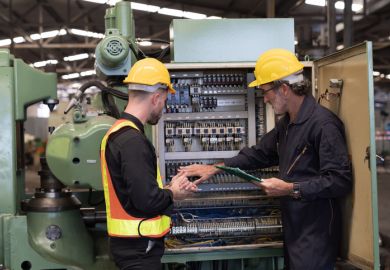I have spent many years advocating for apprenticeships, first as an apprentice, now as chair of the UK’s Science Apprenticeship Forum. So I can’t help but feel a mix of concern and frustration about the new Labour government’s proposed changes to the apprenticeship levy.
In September, the prime minister, Sir Keir Starmer, announced that the apprentice levy of 0.5 per cent, charged on the wage bills of all large employers, would be expanded to become a wider “growth and skills levy” that encompasses shorter programmes at lower skills levels. At the same time, however, employers would no longer be able to use their share of the levy to fund level 7 (master’s-level) degree apprenticeships.
This is a very misguided move. I understand that funding a single level 7 apprenticeship might cost more than multiple level 2 (GCSE level) or level 3 (A level) apprenticeships. And I concede that there is a clear need to encourage young people to enter the workforce early, especially when youth unemployment remains a challenge. Entry-level apprenticeships provide a way to gain work experience, build skills and grow a professional network.
However, the UK can’t afford to prioritise numbers over quality. Level 7 apprenticeships allow those already in the field to upskill or move into new areas. In today’s fast-paced world, where technology evolves rapidly, ongoing learning is essential for both personal development and industry advancement in areas such as engineering, biotechnology and data science. Without these apprenticeships, the UK risks falling behind globally.
We also need to talk about social mobility.
I started a level 3 apprenticeship as a 19-year-old young mum. I have since progressed to levels 5 (foundation degree) and 6 (bachelor’s degree), with opportunities to continue to level 7. Having apprenticeships at all levels enabled me to further my education and gain advanced skills to climb the career ladder – all while raising a young family and avoiding student debts.
The proposed reforms could significantly impact many individuals from disadvantaged and under-represented backgrounds, who rely on level 7 apprenticeships as an alternative, paid route to postgraduate education, combining extensive hands-on training with academic study.
I’ve met so many talented individuals who, like me, struggled to afford traditional paths but found their way through apprenticeships. Do we really want to hinder their progress and prevent them reaching senior positions? After all, innovation thrives on a mix of experiences and viewpoints. If we restrict opportunities for individuals from varied backgrounds, we risk stifling the UK’s ability to innovate and solve complex problems.
Let’s not underestimate the skills that existing apprenticeships develop. Shorter duration models aim to get more employees into the workforce quickly, but there’s a real risk that these “mini apprenticeships” could devalue the entire system. Over the years, I and many others have fought hard to change perceptions about apprenticeships, pushing back against the stigma that they are second-rate compared with traditional education routes. Shorter programmes could undermine this progress.
When I mentor early career apprentices, I often stress the importance of not undervaluing the length and depth of their training, guiding them to realise that, even as apprentices, they are as valuable as any other employee. Rushing the apprenticeship process could hinder learners and shake employers’ confidence to hire them.
As for level 7 apprenticeships, the ending of levy funding will require universities and employers to do their best to fill the gap. Universities should explore innovative funding models, such as co-sponsored programmes with industry partners. And those partners need to recognise the ongoing, long-term value of investing in level 7 apprenticeships. Yes, they come with upfront costs, but in return for that investment they get skilled employees ready to innovate and tackle future challenges.
Apprenticeships at all levels have vital roles in creating a well-rounded, highly skilled workforce, and I urge us all to find ways to support them. The future of UK industries and countless individuals seeking pathways to success truly depends on it.
Tyler Harvey-Cowlishaw is chair of the Science Apprenticeship Forum.
POSTSCRIPT:
Print headline: Don’t defund apprenticeships
Register to continue
Why register?
- Registration is free and only takes a moment
- Once registered, you can read 3 articles a month
- Sign up for our newsletter
Subscribe
Or subscribe for unlimited access to:
- Unlimited access to news, views, insights & reviews
- Digital editions
- Digital access to THE’s university and college rankings analysis
Already registered or a current subscriber?








